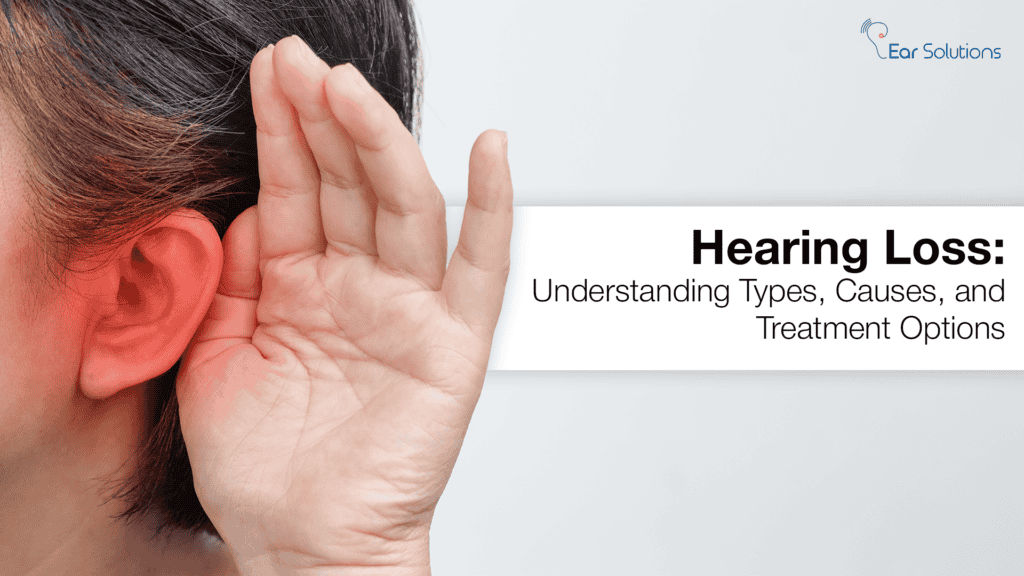Our hearing is one of the most important senses and if someone is having difficulty in listening then he or she might be dealing with hearing loss. It is a common condition that affects a lot of individuals worldwide.
There’s a myth in Indian society that hearing loss only impacts individuals of old age but that’s not true. To burst this myth, let us tell you that hearing loss can impact individuals of all ages. In this blog, we’ll understand what is hearing loss, its types, what are the causes of hearing loss, and most importantly the treatment options for hearing loss.
Simple Definition Of Hearing Loss
Basically, hearing loss is the partial or total inability to hear sounds in single or both ears. It can range from mild, where soft sounds are difficult to hear, to profound, where even the loudest sounds are imperceptible. The important fact is that hearing loss can be temporary or permanent and can affect people of any age, though it is more common in older adults.
Exploring The Types of Hearing Loss
Hearing loss is generally categorized into three main types that are conductive, sensorineural, and mixed hearing loss.
Conductive Hearing Loss
The first type is conductive hearing loss which occurs when there is a problem with the transmission of sound waves through the outer or middle ear. This type of hearing loss can be caused by ear infections, fluid in the middle ear, earwax buildup, or structural abnormalities. Conductive hearing loss is often temporary and can be treated with medical intervention or surgery.
Sensorineural Hearing Loss
Sensorineural hearing loss is the second type of hearing loss which is caused by damage to the inner ear (also known as cochlea) or the auditory nerve pathways. It is the most common type of hearing loss and is usually permanent. Causes of sensorineural hearing loss include ageing (medical term: presbycusis), exposure to loud noise, head trauma, genetic factors, and certain medications that can be ototoxic.
Mixed Hearing Loss
The third one is mixed hearing loss which is a combination of conductive and sensorineural hearing loss that makes it more complicated. It occurs when there are problems in both the outer or middle ear and the inner ear or auditory nerve. Treatment for mixed hearing loss involves addressing both the conductive and sensorineural components.
The Causes of Hearing Loss
Hearing loss can result from various factors, including:
Ageing: Natural ageing processes can lead to the gradual loss of hearing ability, particularly high-frequency sounds.
Noise Exposure: Prolonged exposure to loud noises, such as from machinery, concerts, or headphones, can damage the hair cells in the cochlea.
Genetics: Hereditary factors can predispose individuals to hearing loss.
Infections: Ear infections, meningitis, measles, and mumps can damage the ear structures.
Medications: Certain drugs, including some antibiotics, chemotherapy drugs, and high doses of aspirin, can be ototoxic.
Trauma: Head injuries or sudden changes in pressure (barotrauma) can cause hearing loss.
Medical Conditions: Diseases like diabetes, hypertension, and autoimmune disorders can affect hearing.
Earwax Buildup: Excessive earwax can block the ear canal and impair hearing.
Symptoms of Hearing Loss
The symptoms of hearing loss can differ depending on the type and severity of the condition. Some of the common signs include:
- Difficulty understanding speech, especially in noisy environments.
- Frequently asking others to repeat themselves.
- Turning up the volume of the television or radio.
- Experiencing a ringing or buzzing sound in the ears (tinnitus).
- Avoiding social situations due to difficulty hearing.
- Struggling to hear high-pitched sounds, such as children’s voices or birds chirping.
How You Can Diagnose Hearing Loss?
If you doubt having hearing loss, it is essential to seek professional evaluation from an expert and certified audiologist. The diagnostic process typically involves these
Medical History and Physical Examination
The audiologist will take a detailed medical history and perform a physical examination of your ears to check for any visible issues, such as earwax buildup or infections.
Hearing Tests:
Pure-Tone Audiometry: This test measures your ability to hear different pitches and volumes. You will be asked to wear headphones and indicate when you hear a sound.
Speech Audiometry: This test evaluates your ability to understand speech at different volume levels.
Tympanometry: This test assesses the function of the middle ear by measuring the movement of the eardrum in response to changes in air pressure.
Otoacoustic Emissions (OAEs): This test measures sound waves produced in the inner ear to assess cochlear function.
Auditory Brainstem Response (ABR): This test evaluates the auditory nerve and brain pathways by measuring the brain’s response to sound stimuli.
Treatment Options for Hearing Loss
The treatment for hearing loss totally depends on its type and severity. Some common treatment options are
Hearing Aids:
Hearing aids are the most common yet effective solution to deal with hearing issues. These are electronic devices that amplify sound. They are suitable for individuals with mild to severe hearing loss and come in various styles, including behind-the-ear (BTE), in-the-ear (ITE), and in-the-canal (ITC). Modern and digital hearing aids offer advanced features such as Bluetooth connectivity, noise reduction, directional microphones, and artificial intelligence that make your hearing much easier.
Hearing aid machines can help you regain healthy hearing and enjoy your life to the fullest. You can get your ideal ear machine at the best price at the Ear Solutions hearing aid clinic. Ear Solutions is a renowned company in India that deals in advanced hearing solutions helping those individuals who deal with hearing loss.
Cochlear Implants:
The next treatment option is cochlear implants. They are surgically implanted devices that bypass damaged hair cells in the cochlea and directly stimulate the auditory nerve. They are suitable for individuals with severe to profound sensorineural hearing loss who do not benefit from hearing aids.
Bone-Anchored Hearing Systems (BAHS):
BAHS are surgically implanted devices that transmit sound through bone conduction. They are suitable for individuals with conductive or mixed hearing loss, as well as single-sided deafness.
Assistive Listening Devices (ALDs):
ALDs include devices such as FM systems, infrared systems, and loop systems that help individuals hear better in specific situations, such as in classrooms or theatres.
Medical Treatment and Surgery:
For conductive hearing loss, medical treatment or surgery may be necessary. This can include removing earwax, treating infections, or surgically repairing structural abnormalities.
Communication Strategies:
Individuals with hearing loss can benefit from communication strategies such as lip-reading, using visual cues, and reducing background noise. Joining support groups and seeking counselling can also provide emotional and psychological support.
Conclusion
Hearing loss can significantly impact your quality of life, but if you diagnose it early then there are chances that your loss will not increase. With the help of appropriate treatment, many people have effectively managed their condition and continued to enjoy their daily activities.
Understanding the different types of hearing loss, their causes, and the available treatment options is crucial for making informed decisions about your hearing health. If you suspect you have hearing loss, seek professional evaluation from one of the experienced audiologists at the Ear Solutions hearing aid centre to determine the best course of action for your specific needs.
Ear Solutions is a certified partner of renowned hearing aid brands that’s why they can offer the best deals on hearing aid prices. You can visit your nearest Ear Solutions hearing aid clinic and get your hearing tested for free by a professional.





